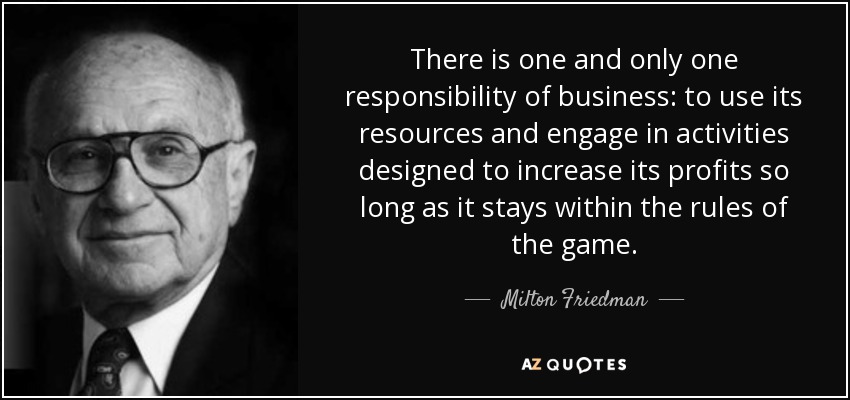
Milton Friedman [1912 – 2006] was an American economist, Nobel laureate [1976], and leader of the Chicago school of economics, a neoclassical school of economic thought that rejected Keynesianism. His political philosophy acclaimed the virtues of a free-market economic system with minimal government intervention. The Economist described him as “the most influential economist of the second half of the 20th century … possibly of all of it”.
The above quote was originally expressed in his 1962 book “Capitalism and Freedom”, then exposed to a larger audience in a 1970 New York Times Magazine article. And it fits more than perfectly within the neo-liberal economic ideology that came up in the mid-70s.
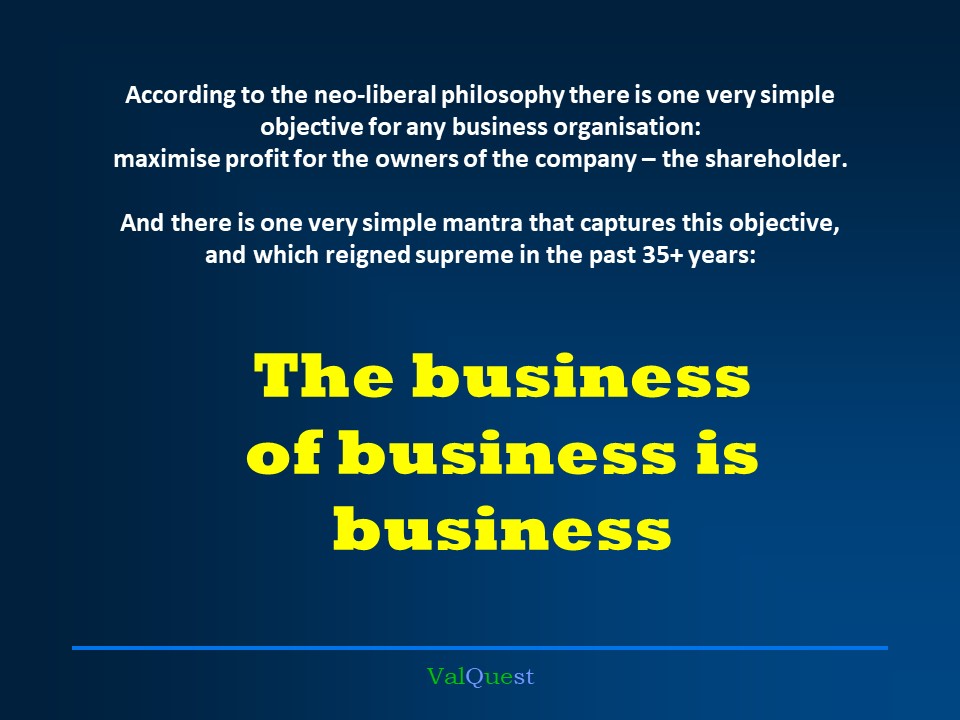
The heart of my narrative concerns the transition of this [still dominant] USA business philosophy and practice of large corporations to a sustainable and socially responsible one.
Why?
It is because international corporations are the most powerful institutions on the planet. They are the major part of the immense problems we face today, but they will also be a major part of the solutions.
Certainly, during the past 10 years or so, I have seen a clear paradigm shift emerging. And in the course of the past 3 – 5 years even more so. Especially in Europe.
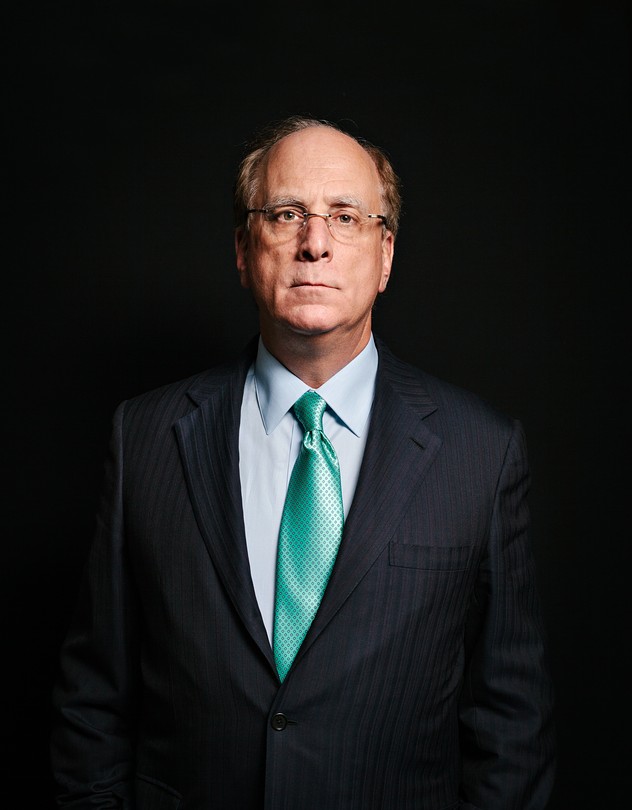
Larry Fink is the CEO of BlackRock, which is the world’s largest investment fund, with $8.7 trillion in assets under management [2020 annual]. That is more than the total economies of France, Germany and Italy together [where 210 mln. people live and work]. The corporation operates globally with 70 offices in 30 countries and has clients in 100 countries.

Volkswagen Group – 100 production facilities in 27 countries. Produces more than 10+ mln. cars per year [before covid-19]. Has 661.000 employees. Revenue in 2020: €223 bln.
illustration: Wikimedia commons

Shell Group – Revenue in 2019 €313 bln. [which equals more than 90% of the Dutch National Government Expenditures in 2019]; it has 93.000 employees, in 70+ countries.

Unilever has a revenue of €50.7 bln. [2020]. About 2.5 bln. people [nearly 1/3 of the total world population] use at least one of its products on any given day; the company has 161.000 employees.





The influence/power of digital platforms like Amazon, Apple, Google, Facebook, and Microsoft is unknown, but it is something that concerns consumers and the governments of the USA and Europe.
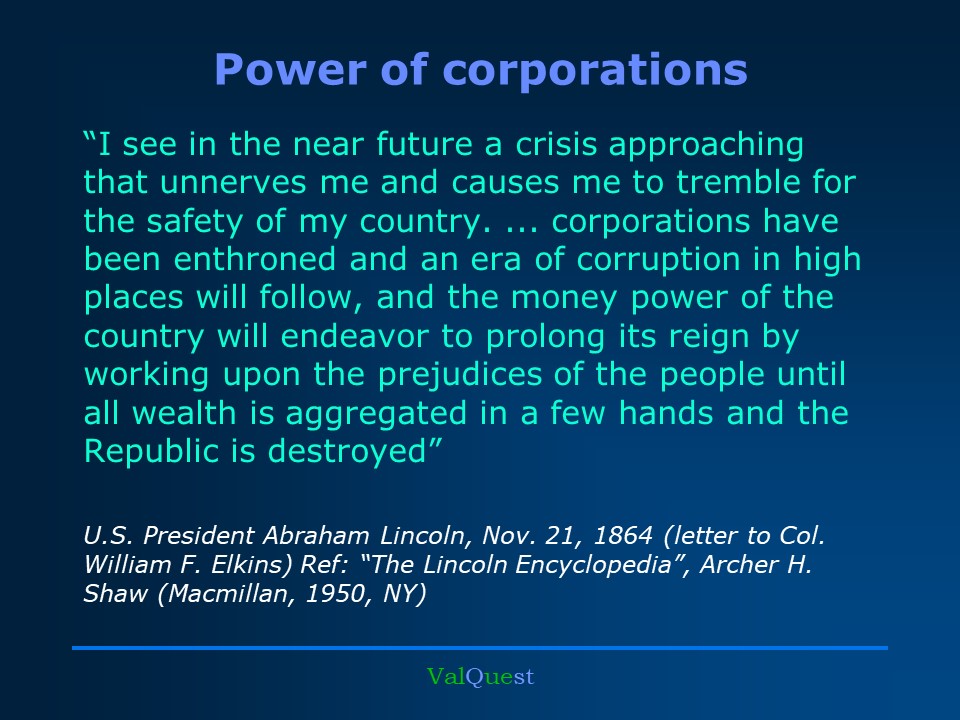
It is therefore not new, that too great a power of enormous corporations can be seen and experienced as a direct and fatal threat to a democratic society …
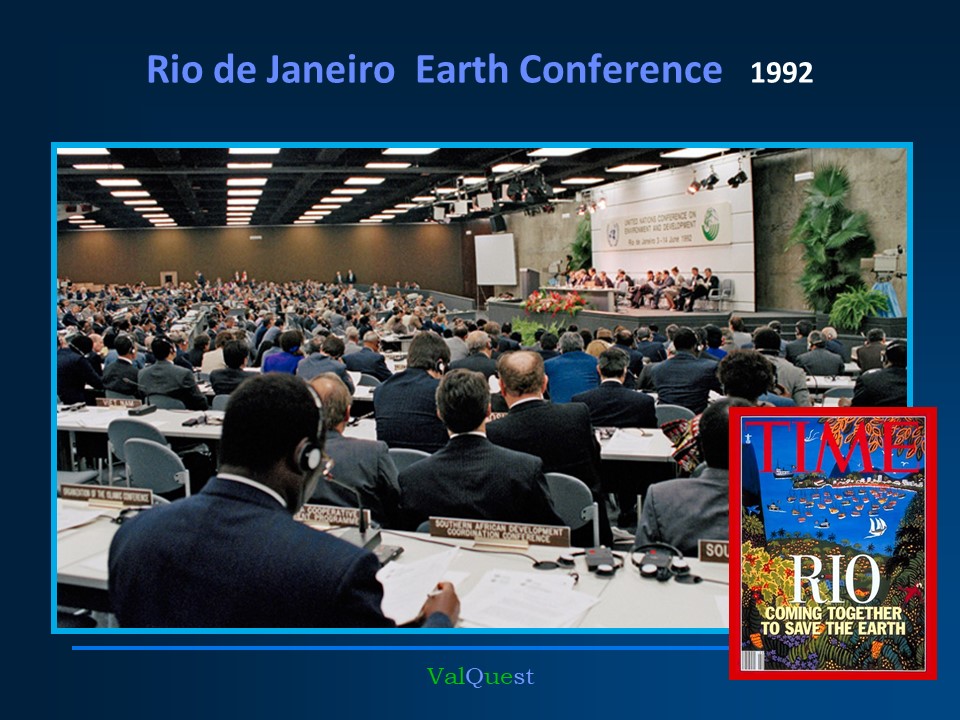
For me, the story begins with the United Nations Conference on Environment and Development, also known as the ‘Earth Conference’. It brought together political leaders, diplomats, scientists, representatives of the media, and non-governmental organizations from 179 countries. The primary objective of the Rio ‘Earth Summit’ was to produce a broad agenda and a new blueprint for international action on environmental and development issues. I regard this conference as a milestone event in the history of mankind.
In the UN´s wording: “The ‘Earth Summit’ recognized that integrating and balancing economic, social and environmental concerns in meeting our needs is vital for sustaining human life on the planet and that such an integrated approach is possible. The conference also recognized that integrating and balancing economic, social, and environmental dimensions required new perceptions of the way we produce and consume, the way we live and work, and the way we make decisions. This concept was revolutionary for its time”.
The contribution of the international business world consisted of the report “Changing Course”. It was produced thanks to a two-year process organized and led by a Swiss businessman, Stephan Schmidheiny. He created a forum in which 46 Chief Executive Officers from leading Multinational Corporations [such as Shell, Volkswagen, Mitsubishi, Dow Chemical, Tata Industries] developed a business perspective on environmental and development challenges. This forum later became the World Business Council for Sustainable Development.
When I read the report, I could not believe that it had come about thanks to the input of these top managers of large Multinational Corporations.
These were radical, revolutionary texts: hard-hitting analyses of world problems, the role companies play in causing these problems, and bold, groundbreaking proposals for solutions.
The report made quite an impression worldwide, and certainly on me.
Since Rio de Janeiro, I have been able to observe a clear evolution in conceptual thinking and doing concerning environmental management: from the primitive “raising the chimney” so that soot drifts much further with the wind and does not settle in “the backyard of the factory “, via “pollution prevention pays” to the intelligent integral system approach of “creating shared value “.
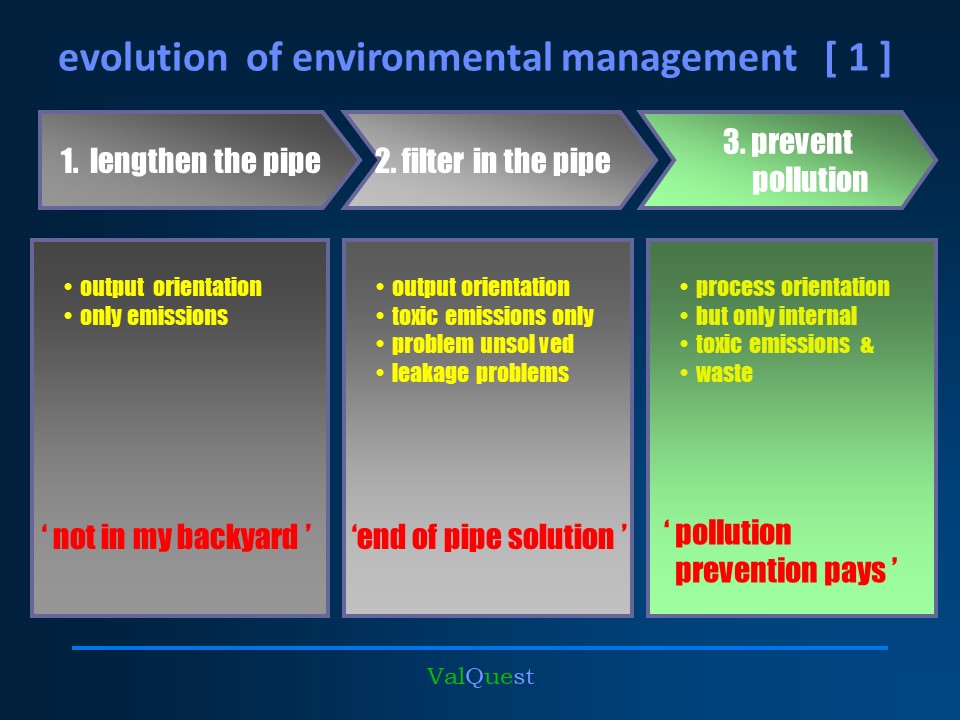

“Changing Course” was followed by many new initiatives by companies and publications on “sustainable entrepreneurship”. In the second half of the 1990s, two books, in particular, played an essential role in the conceptual development of the professional, holistic systems approach that is necessary. Only a limited number of entrepreneurs dared to take on this structural approach; but they were there, and their numbers grew.

The developments took such forms that I stated in a speech in Beijing in 2004 that the new vision of entrepreneurship, on the objectives of a corporation, had proven to be successful.
I specified the business value proposition, as well as the leadership vision of “man & enterprise”.
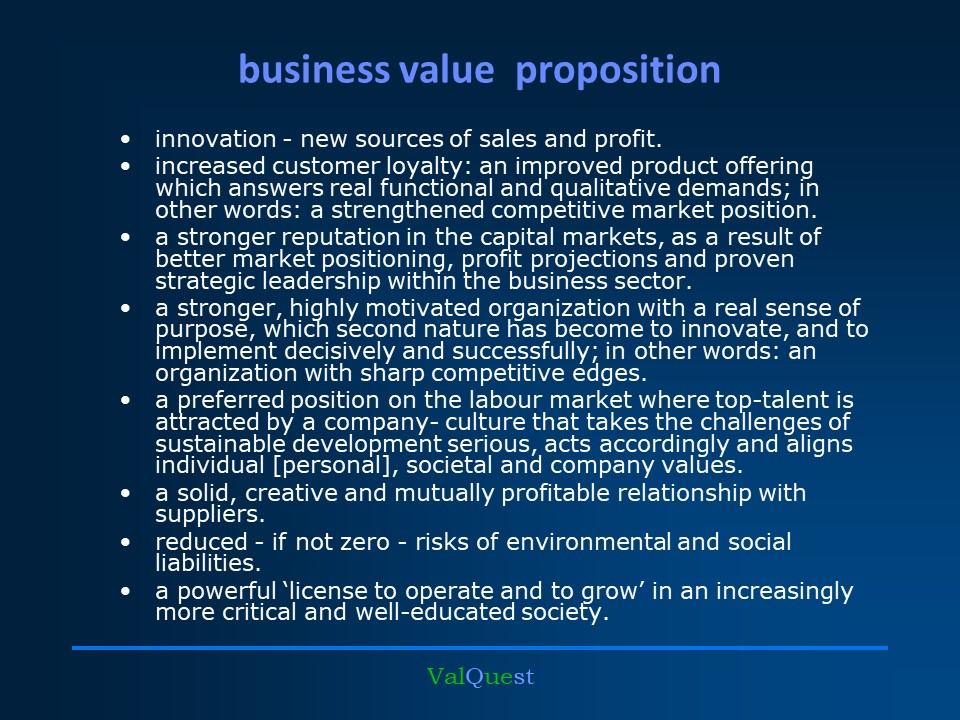
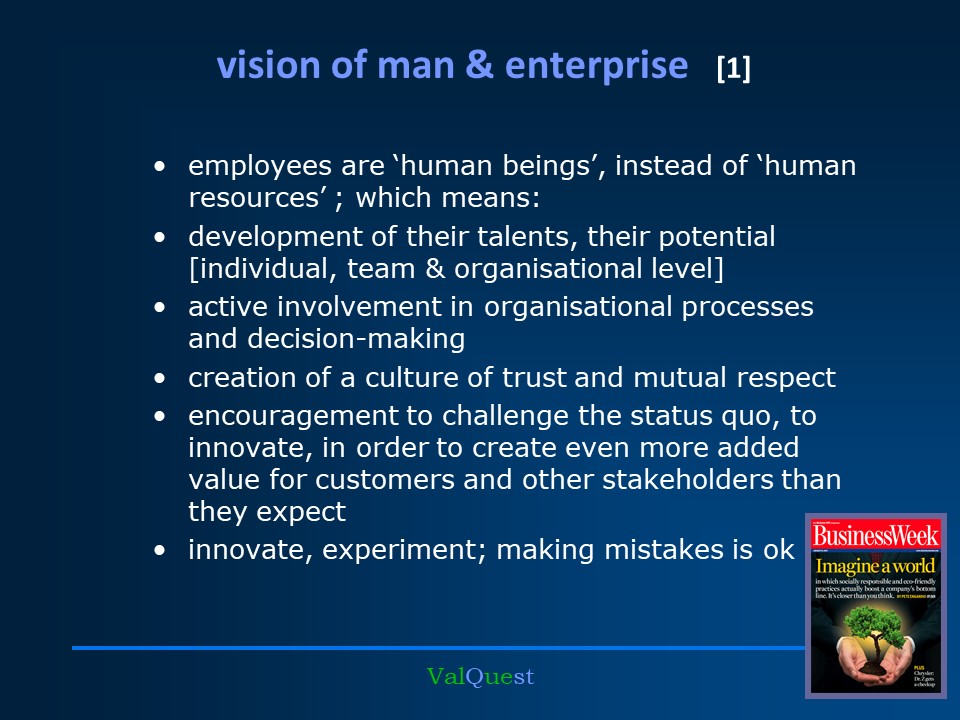
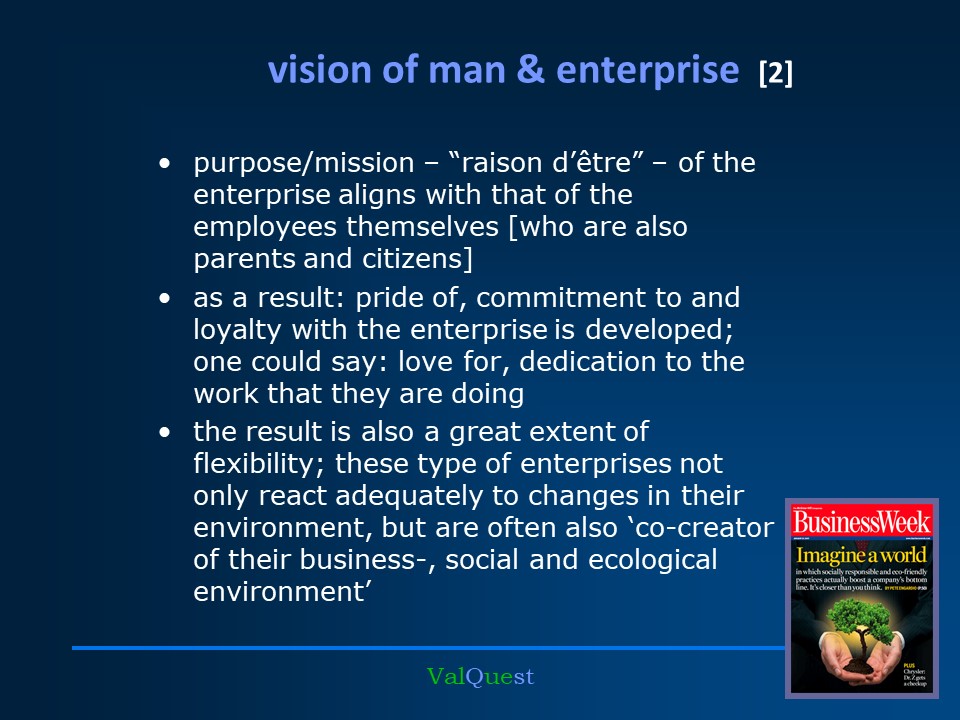
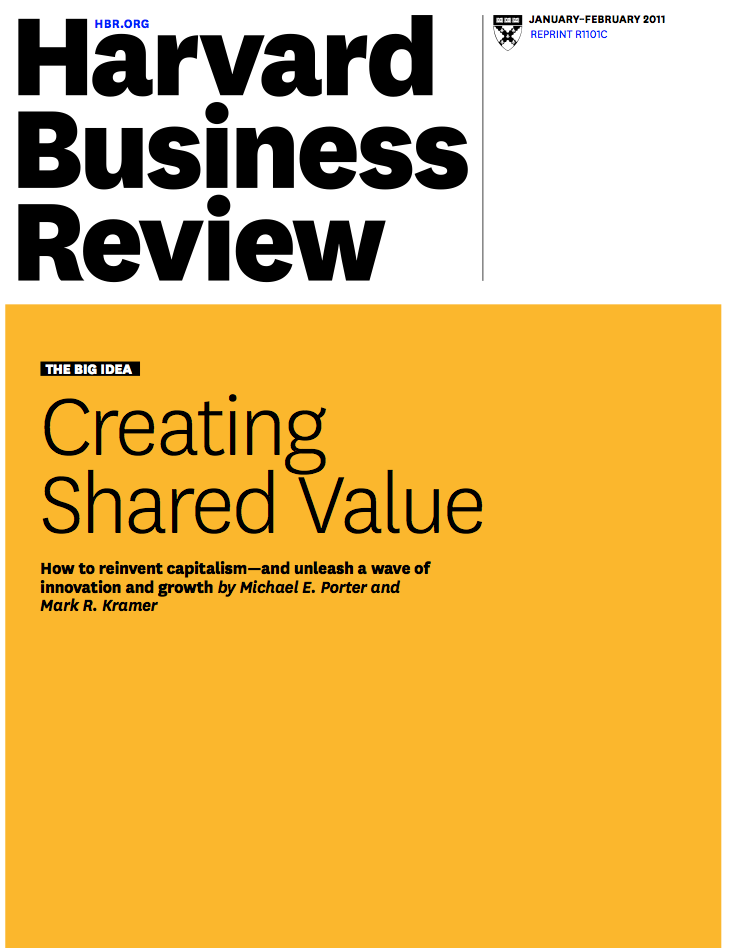
In the January / February 2011 edition of the Harvard Business Review, professors Michael Porter and Mark Kramer gave their views on the need to thoroughly renew capitalism and presented their ideas about sustainable business, calling it “Creating Shared Value”.
But at the time, it was still a small vanguard of companies that followed their vision.
In various parts of this website, I have shown what the neo-liberal philosophy has led to. Specifically in the section “reflections” – “God save America”:
Also in the section “the times they are a-changin” – “redefining capitalism”:
For the companies, this led, among many other things, to a strong focus on the short term, rising stock market prices by purchasing their own shares, so that fewer resources were available to invest in product innovation and employee training. And of course the absurd income increases of top management.
Will 19 August 2019 prove to be a historic day, the day on which the mainstream of American entrepreneurs also turned to “creating shared value”? It’s a good sign, but I have yet to see it happen.
The headline of the press release reads as follows: “Business Roundtable redefines the purpose of a corporation to promote ‘An Economy That Serves All Americans’ [italic mine].
This gives me the impression that this statement mainly aims to respond to the increasing social unrest in the USA, as a result of the poignant inequality and total standstill in wage development over the past 30 years.
But, yes, it is a hopeful sign.
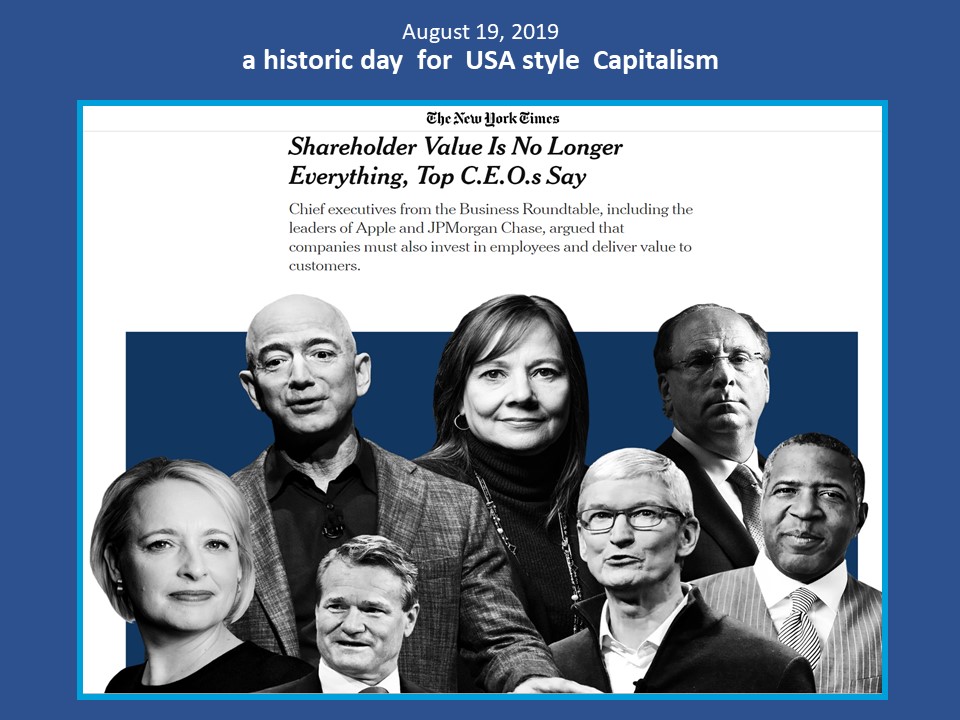
Since the early 1990s, the carpet tile company Interface has been at the vanguard of companies that take the challenges of sustainable development very seriously.
In 2009 Paul Polman took Unilever fundamentally on a path to sustainability. His approach was visionary and daring. And has inspired many.
In the words of Ilham Kadri, CEO of Solvay: “Sustainability starts with us, and walking the talk will turn our ambition into reality”. A very interesting chemical [!] Multinational, inspired by a visionary woman.
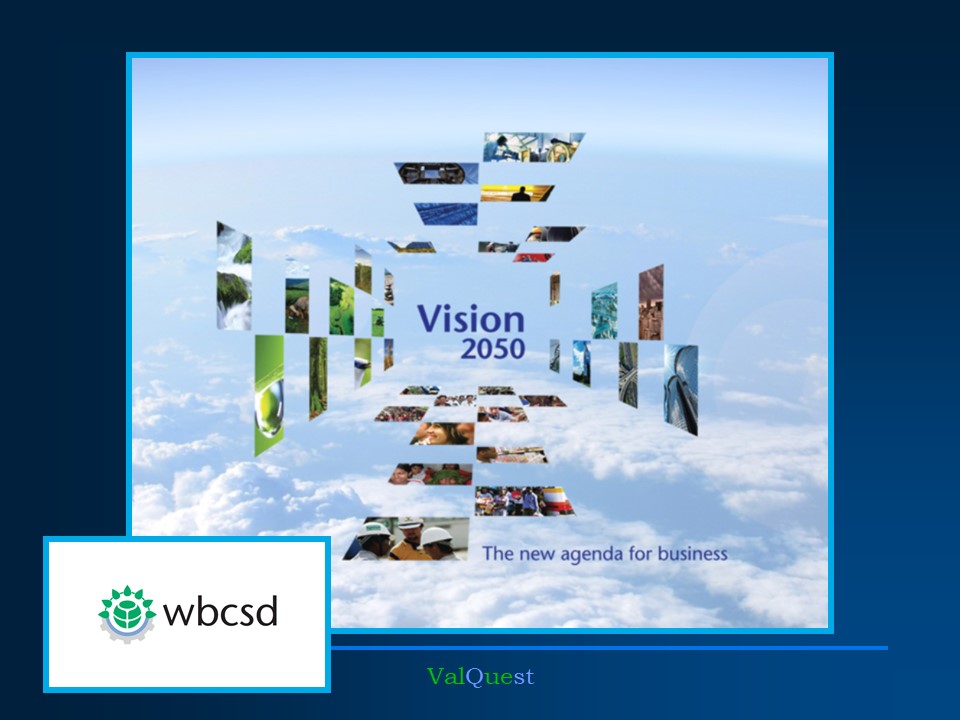
The WBCSD is a CEO-led organization of over 200 multinational corporations. It is by far the most influential forum for the business world on sustainability issues.
In March 2021 it launched its updated “Vision 2050”. A very important contribution to the transition to the new business paradigm.
And a must-read.
Certified B Corporations are a new kind of business that balances purpose and profit. They are legally required to consider the impact of their decisions on their workers, customers, suppliers, community, and the environment.
They meet the highest standards of verified social and environmental performance, public transparency, and legal accountability.
B Corps redefines business success and builds a more inclusive and sustainable economy. As of April 2020, there are over 3,300 certified B Corporations across 150 industries in 71 countries.
Some examples:
“Professor and former Dean of the Säid Business School in Oxford, Mayer is a leading figure in the global discussion about the purpose and role of the corporation. In Prosperity, he presents a radical and carefully considered prescription for corporations, their ownership, governance, finance, and regulation. Drawing together insights from business, law, economics, science, philosophy, and history, he shows how the corporation can realize its full potential to contribute to economic and social wellbeing of the many, not just the few”.


This website is a personal narrative, based on 50 years experience in international business, non governmental organisations and consulting practise. My guest lectures at the Institute of Environmental Sciences [Leiden University, The Netherlands] are derived from it.
Ludo van Oyen – Brussels, 2021
Some photos are taken from the web. If you think your photo is used and you disagree, please send me an e-mail and I will remove it from this site.